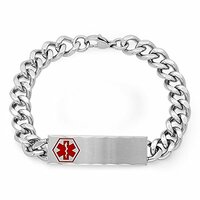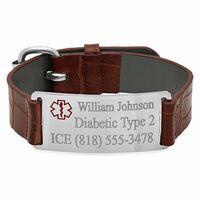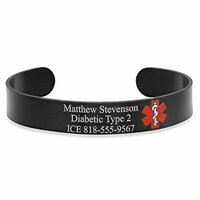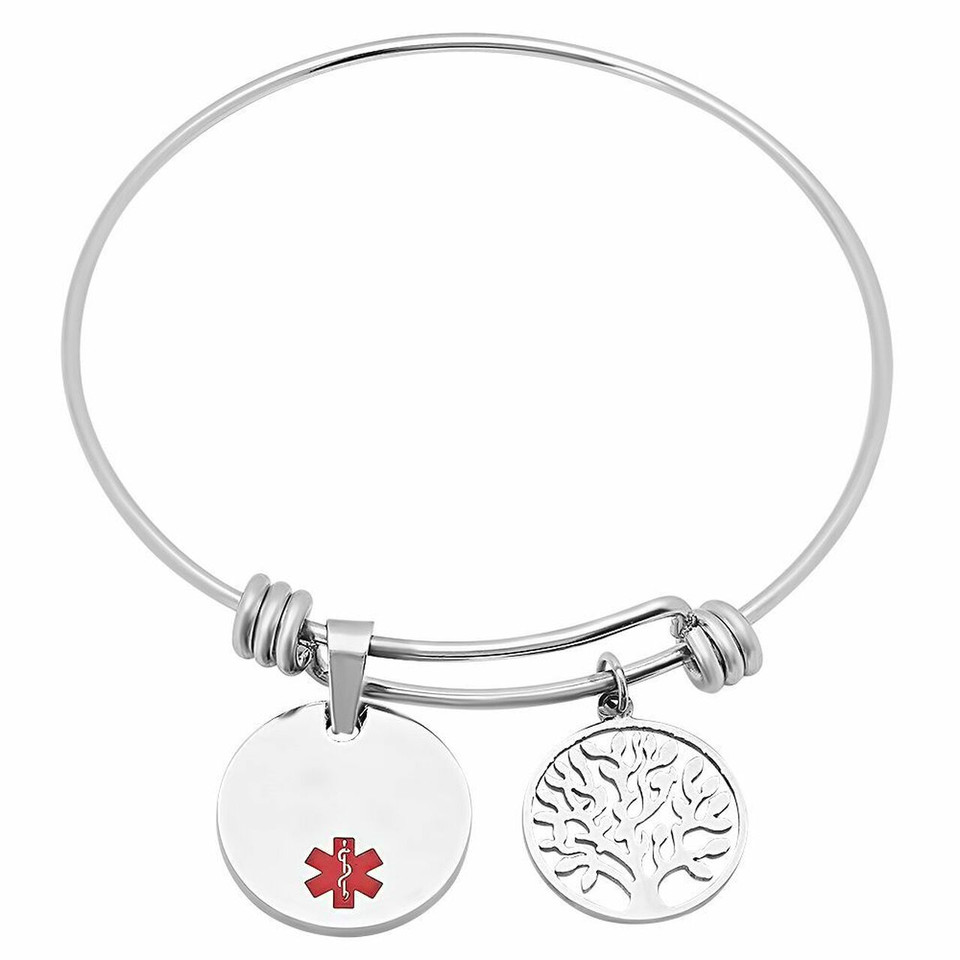If You Are Wondering What to put on a Medical ID? Continue Reading...
Introduction
Have you been contemplating getting a medical ID and simultaneously wondering what to put on it? It is not an easy task. A lot of thinking goes into it. In the following write-up, we will try and arrive at practical answers to the question; of what to put on a medical ID.
What is a Medical ID?
At first glance, a medical ID may appear as a normal piece of jewelry. But this simple looking piece of ornament can save your life in an emergency.
A medical ID or a Medical Identification tag is a symbol worn on a piece of clothing, neck chain, or a bracelet carrying a message that the person wearing it has a medical condition and may need medical assistance.
What is the need to get a medical ID?
As mentioned before, a medical ID can save a person's life during an emergency. Some may feel it is just a fad. However, wearing one all the time with essential medical information can help things become less complicated in case of an emergency.
Health organizations, Doctors, Physicians, Medical Practitioners all around the globe suggest that people with medical conditions should wear a medical ID all the time. It gives you the mental assurance that in case of emergency paramedics are aware of your medical history. It is a fact that most emergency responders look for a medical ID before administering any kind of treatment.
What are the Advantages of Wearing a Medical ID?
As per the experts in the medical field, a medical ID speaks on your behalf to the emergency responders when you cannot do so.
- It helps avoid any kind of misdiagnosis.
- Prompt, immediate, and correct diagnosis goes a long way in providing the right treatment.
- Most importantly, wearing a medical ID on your wrist or around your neck ensures that prompt and correct treatment is provided.
- To avoid any kind of medical errors, wear a medical ID on you.
- Medical responders look for any type of medical ID on you during an emergency.
What to engrave on a medical ID?

Any kind of chronic illness, food allergies, medications, drug allergies, emergency contacts, etc can be engraved on a medical ID. Let us take a deeper look into what exactly should be engraved-
- Chronic illnesses and medical conditions- a person suffering from Autism, Epilepsy, Type 1 and Type 2 Diabetes, Hearing impairment, or Visual Impairment must get the correct name of the illness or disease engraved on their medical ID bracelet or neck chain.
- Allergies- Secondly, food allergies like dairy or nut allergy, insect related allergies like bee stings should be engraved on the ID. Also, allergy to metals like nickel allergy or allergy to certain medicines like penicillin, etc, must be clearly engraved on the medical ID.
- Medications- In addition, if you happen to carry lifesaving auto injections like EpiPens, it is a good idea to get the same engraved along with the medical condition.
- Medications on a wallet card- Another thing that you can put on your medical ID is any prescribed medication that you take regularly. This is important to avoid any unnecessary drug interaction with medications like immunosuppressants, blood thinners or anti-coagulants, and corticosteroids. Along with wearing a medical ID in the form of jewelry, you can carry a wallet card. On a wallet card, you can mention more than one illness or medical condition, or medications that you take.
- Contact information- it is wise to inscribe your emergency contacts number on the medical ID. This way, paramedics or responders can directly contact them for additional details and information. Ensure that your emergency contacts are always reachable and available. Your emergency contacts can be your doctor, parents, relatives, friends, partner, or neighbors.
The above-mentioned information clearly tells us what to put on a medical ID.
Medical Abbreviations to Engrave
It may not be feasible to engrave the name of the entire medical condition or medications on a medical ID. Using abbreviations is a great idea to keep the information on the ID simple and clear. Below is a list of common medical abbreviations to put on a medical ID-

- Medical conditions- if you suffer from an illness due to which you may fall unconscious, then it is imperative to wear a bracelet or neck chain bearing the name of the illness. Some common abbreviations of medical illnesses are-
- Alzheimer's Diseases- ALZ
- Cancer- CA
- Chronic Kidney Disease- CKD
- Coronary Heart Disease- CHD
- Cystic Fibrosis- CF
- Aortic Valve Replacement- AVR
- Hypertension- HTN
Such fatal conditions can seriously risk your life. Therefore, the sooner the paramedics know your condition, the sooner they can assist you.
2. Medications- If you take any medications, then engrave the same on the medical ID as well. It is important to do so because as mentioned before some drugs can prove life-threatening if mixed. Although it is considered wise to write the full name of the medication rather than abbreviations to avoid any confusion. Some common medication abbreviations are-
- Penicillin- PCN
- Aspirin- ASA
- Auto-injector epinephrine pen- EPIPEN
Also, mention the word 'ON' before the name of the medication to point out the medication you are taking.
3. Allergies- these can range from minor allergic reactions to serious medical reactions like breathlessness. If you have any type of allergy, put the same on the medical Id so that in case of an attack, others know the cause of it. Mostly, foods do not have abbreviations therefore mention words like 'NO' or 'ALLGY' before the food or any other thing you are allergic to. Also, if you have no known allergies mention 'NKA' on your bracelet. If you have no drug allergy then include 'NKDA'. This way the paramedics or first respondents can administer anything without fear.
4. Other Miscellaneous Information- Some diagnostic tests can prove fatal for you especially if you have a medical condition. In that case, it is prudent to engrave what tests can and cannot be carried out for you. Some abbreviations related to this category are
- NO MRI
- Nothing By Mouth- NPO
- Intrauterine Device in place- IUD
- No Chest X-rays- NO CXR
If you have had any kind of joint replacements, then use abbreviations like-
- Total Hip Replacement- THR
- Below-the-knee Amputation- BKA
- Total Knee Replacement- TKR
If you have had any kind of transplants then mention the abbreviations 'TX' after the transplant you have received.

For bone marrow transplant, as an exception, you engrave BMT.
At times it is wise to mention your Blood Type on the medical ID. To do so, write 'BLOOD TYPE' followed by the letter of your blood group. For example, 'BLOOD TYPE B+'.
Who Should Wear a Medical ID?
Following is the list of conditions in which one should wear a medical ID-
- Kidney failure
- Cardiac problems
- Pulmonary conditions
- Blood disorders
- Diabetes
- Food allergies
- Drug allergies
- Alzheimer's
- Breathing Disorders
- Impairments
- Rare diseases
- Surgeries
- Anemia
- Special needs children
- Tourette syndrome
- Taking multiple medications
The list goes on and many other major illnesses and conditions are considered essential enough to be engraved. Not just people with chronic conditions, but some can get their Blood type or contact information, medical records engraved as well.
What are Medical IDs made of?
Traditionally, a medical ID is made of sterling silver or stainless steel. These days silicone medical IDs are quite the rage. These come in various colors and do not beep at airports. They are trendier therefore everyone from children to youth to adults and professionals can wear them.
Final Words
In today's advanced age, where medical treatments can be quickly administered, wearing a medical ID can prove a life-saving device. As a recap, when thinking about what to put on a medical ID, remember the following-
- Medical condition or illness
- Medications you can take or cannot take
- Things you are allergic to
- Emergency contact information


